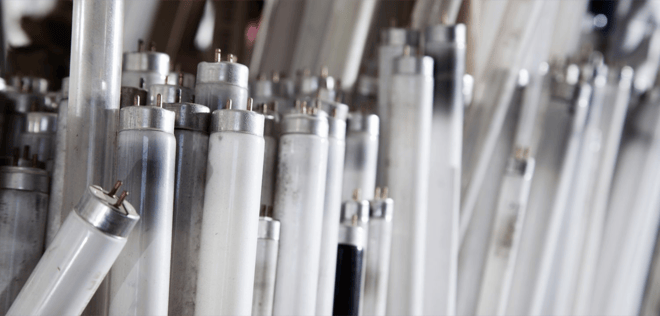Joel Gates, Guest Blogger
Apr 1, 2019 4:49:33 PM
Phasing Out Fluorescent Light Bulbs Can Protect Health & Lower Energy Bills
Fluorescent lights are a common sight in offices, garages, and basements—but they contain toxic mercury and use far more energy than newer alternatives. By phasing out fluorescents in favor of efficient LED bulbs, Rhode Island and Massachusetts can avert a needless health risk, save families and business money on utility bills, and curb greenhouse gas emissions.

LED light bulbs—readily available as replacements for fluorescents in all needed shapes and sizes—do not contain any of the toxic mercury that fluorescent bulbs do. They also cut energy use in half compared to fluorescents, last about twice as long, and typically cost far less to purchase and operate over their lifetime. So why are fluorescents still on store shelves?
In 2022, Vermont and California became the first states to phase out the sale of most fluorescent bulbs. As other states move to eliminate fluorescents, Rhode Island and Massachusetts risk becoming dumping grounds for inefficient, mercury-containing bulbs that suppliers cannot sell elsewhere. Lawmakers must take prompt action to phase out sales of the most common fluorescent bulbs by 2025.
Reduce the Threat of Mercury Exposure
All fluorescent bulbs contain mercury, a potent neurotoxin that threatens human health and the environment. The World Health Organization counts mercury among the top 10 most dangerous chemicals impacting public health.
When fluorescent bulbs are accidentally broken—whether in homes, businesses, or the waste management system—they present a health hazard to those nearby. And when fluorescent bulbs are not disposed of properly—as happens with an estimated 75% of bulbs— mercury leaches from landfills and eventually contaminates rivers, lakes, and oceans and the fish and shellfish within them.
Maintenance professionals, custodial workers, teachers, and other workers run the risk of being exposed to mercury pollution when a fluorescent bulb is accidentally broken. Exposure can lead to weakened memory, insomnia, dizziness, tremors, and other symptoms. LEDs are 100% mercury-free and a much safer option for maintenance professionals. CA Teamsters, the Service Employees International Union of California, Waste Management, and Republic Services all supported this legislation in California because of this needless health risk.
Rhode Island and Massachusetts laws already regulate mercury-containing products, including fluorescent light bulbs, because of their toxic nature. LEDs, which are mercury-free, are a much safer option. Technological advancements in recent years have made them readily available and cost-effective.
Save Money on Electric Bills
Fluorescent bulbs are no longer the most affordable lighting option. Because they are more energy efficient than fluorescents, LEDs cost less to operate, more than paying back their slightly higher upfront costs—which continue to drop each year—through lower electric bills. A typical school could see more than $5,000 in annual utility bill savings if all its fluorescent bulbs were replaced with LEDs.
 LEDs also last about twice as long as fluorescents, so they need to be replaced less often. And because LEDs are mercury-free, they can be disposed of more easily and cheaply than fluorescents when the time comes.
LEDs also last about twice as long as fluorescents, so they need to be replaced less often. And because LEDs are mercury-free, they can be disposed of more easily and cheaply than fluorescents when the time comes.
By 2030, Rhode Island and Massachusetts households and businesses would achieve the following savings on their annual utility bills.
| Annual Utility Bill Savings | |
| Rhode Island | $20 million |
| Massachusetts | $146 million |
Avert Needless Greenhouse Gas Emissions
LEDs use approximately half the electricity as fluorescent bulbs to produce the same amount of light. As a result, accelerating the transition to LEDs can reduce planet-warming emissions from power plants and help prevent the worst effects of climate change.
By 2050, Rhode Island and Massachusetts could avoid the following carbon dioxide emissions.
| Avoided Carbon Dioxide Emissions | Equivalent Amount of Gas Cars on the Road | |
| Rhode Island | 136,000 metric tons | 29,300 |
| Massachusetts | 954,000 metric tons | 205,000 |
Rhode Island & Massachusetts Lawmakers Can Phase Out Fluorescents
Phasing out fluorescent bulbs can protect workers, and reduce mercury pollution, greenhouse gas emissions, and utility bills. Lawmakers must take action by passing H5550 in Rhode Island and HD2448 & SD1704 in Massachusetts, ensuring a transition from fluorescents to LEDs.
The information and data in this blog post were provided by our national partner, the Appliance Standards Awareness Project. We encourage you to reach out to either of us with questions.
Related Posts
Doubling Down on Renewables: Improving the MA Renewable Portfolio Standard and RI Renewable Energy Standard
Climate scientists have concluded that in order to prevent the Earth’s temperature from rising 2°C and avert the...
Eugenia Gibbons and Kat Burnham
Apr 9, 2015 1:52:00 PM
Comments